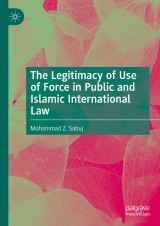Details

The Legitimacy of Use of Force in Public and Islamic International Law
|
128,39 € |
|
| Verlag: | Palgrave Macmillan |
| Format: | |
| Veröffentl.: | 22.06.2021 |
| ISBN/EAN: | 9783030772987 |
| Sprache: | englisch |
Dieses eBook enthält ein Wasserzeichen.
Beschreibungen
<p>This book investigates the legitimacy deficits of two potentially conflicting legal systems, namely Public and Islamic international law. It discusses the challenges that Public international law is being presented within the context of its relationship with Islamic international law. It explores how best to overcome these challenges through a comparative examination of state practices on the use of force. It highlights the legal-political legacies that evolved surrounding the claims of the legitimacy of use of force by armed non-state actors, states, and regional organizations. This book offers a critical analysis of these legacies in line with the Islamic Shari‘a law, United Nations Charter, state practices, and customs. It concludes that the legitimacy question has reached a vantage point where it cannot be answered either by Islamic or Public international law as a mutually exclusive legal system. Instead, Public international law must take a coherent approach within the existing legal framework.</p><p> </p><p><br></p>
Introduction<div>Chapter 1: The Legitimacy of Public International Law on the Use of Force</div><div>Chapter 2: Responses to the Legitimacy of Use of Force</div><div>Chapter 3: Use of Force in Islamic International Law</div><div>Chapter 4: Legitimacy of Use of Force in Islamic International Law: The Legal-Political Legacies Chapter 5: Answer to the Legitimacy Question: A Coherent Approach</div><div>Chapter 6: Conclusion</div>
<p><b>Mohammad Z. Sabuj</b>, is a Barrister (Lincoln’s Inn), and Lecturer in Law, Royal Holloway, University of London, UK.</p><p></p>
This book investigates the legitimacy deficits of two potentially conflicting legal systems, namely Public and Islamic international law. It discusses the challenges that Public international law is being presented within the context of its relationship with Islamic international law. It explores how best to overcome these challenges through a comparative examination of state practices on the use of force. It highlights the legal-political legacies that evolved surrounding the claims of the legitimacy of use of force by armed non-state actors, states, and regional organizations. This book offers a critical analysis of these legacies in line with the Islamic Shari‘a law, United Nations Charter, state practices, and customs. It concludes that the legitimacy question has reached a vantage point where it cannot be answered either by Islamic or Public international law as a mutually exclusive legal system. Instead, Public international law must take a coherent approach within the existing legal framework.<p><b>Mohammad Z. Sabuj</b>, is a Barrister (Lincoln’s Inn), and Lecturer in Law, Royal Holloway, University of London, UK.</p>
<p>Explores the legitimacy of Use of Force, one of the most contested topics in current international affairs.Analyses the differences between two potentially conflicting legal systems, proposing how the two could be complementary.</p><p>Argues how different cultural and religious views can lead to different interpretations of what forms of power people believe to be justified.</p>
‘This book represents a necessary corrective to most discussions around the use of force in international law. In presenting the contribution of Islamic Law on this issue, Mohammad Sabuj makes a persuasive argument for a more rounded understanding of the question of legitimacy, particularly in the light of so many military interventions being carried out against Muslim states and non-state groups inspired by Islamic ideals. Dr Sabuj’s argument that the legitimacy of the use of force must involve a recognition of the place of Islamic Law within the broader scope of Public International Law is one that demands serious engagement amongst scholars, students and practitioners of international law’.<p>—<b>Simon Behrman</b>, Associate Professor of Law, University of Warwick, UK</p> ‘The book provides a much-needed analysis of the concept of use of force, filling a gap in the existing scholarship that compares international law and Islamic law. Sabuj analyses the legitimacy deficit of international law, leading to a rejection of norms in the Muslim world, and proposes ways forward to transcend the tensions. I highly recommend the book to anyone who seeks to understand how and why the legitimacy of international law is sometimes questioned’.<p></p>
<p>—<b>Anicée</b><b> van Engeland</b>, Associate Professor, Cranfield University, UK</p>
<p>—<b>Anicée</b><b> van Engeland</b>, Associate Professor, Cranfield University, UK</p>
Diese Produkte könnten Sie auch interessieren:

Mapping Sustainability

von: Nazli Choucri, Dinsha Mistree, Farnaz Haghseta, Toufic Mezher, Wallace R. Baker, Carlos I. Ortiz

96,29 €

Fertility, Living Arrangements, Care and Mobility

von: John Stillwell, Ernestina Coast, Dylan Kneale

96,29 €














